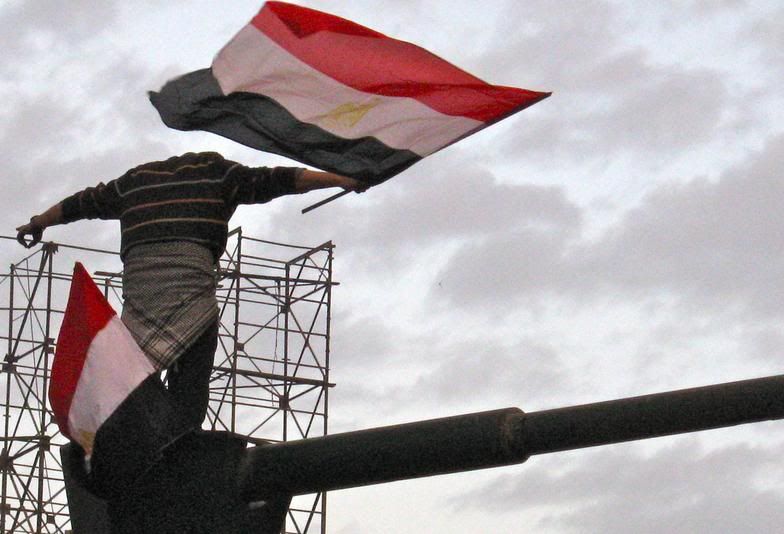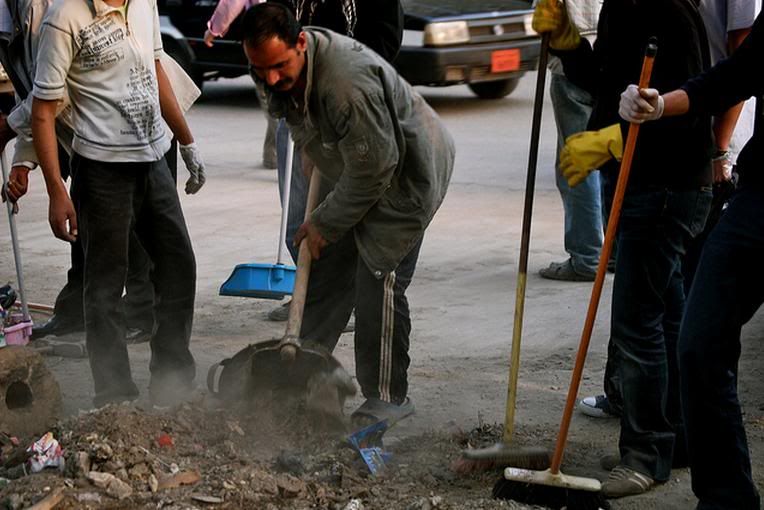INFANT REVOLUTION: THE FUTURE OF EGYPT AND THE ARAB WORLD
 By Satenik HarutyunyanStaff WriterOn Feb. 11, 2011, the people of Egypt made history. After eighteen days of nonviolent mass protest, they drove their authoritarian president of three decades, Hosni Mubarak, out of power. The people of Egypt, and the millions who stand in solidarity with them around the world, celebrated the prospect of a fresh beginning for the nation. Chants for peace and freedom rang ceaselessly throughout Liberation Square in Cairo on Friday—the Egyptian people felt their revolution taking root with hopes for it to grow into a legitimate democracy.But besides bringing these feelings of euphoria and celebration, Mubarak’s removal brings forth an uncertain waiting period for Egypt. After all, the resignation is only a small part of an immense process that is still in its embryonic phases. History demonstrates that revolutions do not manifest themselves in the toppling of the old regime, but in the establishment of sustainable new ones. For example, after the French Revolution of 1792, the country went through numerous unstable phases until Bonaparte ended the uprising by taking power. And when the Berlin Wall fell in 1989, East and West Germany were not reunified for another three years. The point worth noting here is that restructuring a governmental system that has reigned for decades will not occur quickly, nor will it happen without substantial obstacles. With Mubarak stepping down, the Supreme Armed Forces Council—Egypt's council of top military commanders—has temporarily taken control of the state's infrastructure until the next step is calculated.
By Satenik HarutyunyanStaff WriterOn Feb. 11, 2011, the people of Egypt made history. After eighteen days of nonviolent mass protest, they drove their authoritarian president of three decades, Hosni Mubarak, out of power. The people of Egypt, and the millions who stand in solidarity with them around the world, celebrated the prospect of a fresh beginning for the nation. Chants for peace and freedom rang ceaselessly throughout Liberation Square in Cairo on Friday—the Egyptian people felt their revolution taking root with hopes for it to grow into a legitimate democracy.But besides bringing these feelings of euphoria and celebration, Mubarak’s removal brings forth an uncertain waiting period for Egypt. After all, the resignation is only a small part of an immense process that is still in its embryonic phases. History demonstrates that revolutions do not manifest themselves in the toppling of the old regime, but in the establishment of sustainable new ones. For example, after the French Revolution of 1792, the country went through numerous unstable phases until Bonaparte ended the uprising by taking power. And when the Berlin Wall fell in 1989, East and West Germany were not reunified for another three years. The point worth noting here is that restructuring a governmental system that has reigned for decades will not occur quickly, nor will it happen without substantial obstacles. With Mubarak stepping down, the Supreme Armed Forces Council—Egypt's council of top military commanders—has temporarily taken control of the state's infrastructure until the next step is calculated. Global news, analysts and media have come up with a vast multitude of predictions as to what will unfold in the months to come. Idealists are keeping their fingers crossed for a swift transition to a democratic Egypt that will maintain all diplomatic ties with both Israel and the West. This outcome, however, is highly unlikely due because democratic transition is a lengthy and obstacle ridden process. Equally unlikely, however, is the cynical prediction that an Islamic fundamental group will take advantage of the unrest and seize power. This outlook also predicts the closing of the Suez Canal and Egypt backing out of the peace accords with Israel that have kept the two countries on good terms for thirty years. In this scenario, the Muslim Brotherhood, which was stripped of its political leverage during Mubarak’s reign, may regain its prowess to represent the Islamic parties.But the climate in Egypt shows no signs of a people ready to be easily swayed. Just two days after Mubarak’s resignation, protestors have already begun a new wave of demonstrations. They are sending a clear message to the global community—they are a force to be reckoned with and will continue to fight for progress. On Feb. 13, the military council dissolved the weak Parliament (an extension of Mubarak’s political reach), froze the constitution and scheduled parliamentary and presidential elections six months down the line. For the time being, the military has also promised to honor the Camp David Peace Accords made with Israel in 1978.Until the elections take place in half a year, a military-approved leader will oversee the redrawing of a constitution to include fundamental democratic freedoms. The key to this scenario is that the military only temporarily hold onto the power seized from Mubarak. Given the military’s substantial popular support, this outcome appears realistic. This scenario is also attractive to key international actors such as the United States.
Global news, analysts and media have come up with a vast multitude of predictions as to what will unfold in the months to come. Idealists are keeping their fingers crossed for a swift transition to a democratic Egypt that will maintain all diplomatic ties with both Israel and the West. This outcome, however, is highly unlikely due because democratic transition is a lengthy and obstacle ridden process. Equally unlikely, however, is the cynical prediction that an Islamic fundamental group will take advantage of the unrest and seize power. This outlook also predicts the closing of the Suez Canal and Egypt backing out of the peace accords with Israel that have kept the two countries on good terms for thirty years. In this scenario, the Muslim Brotherhood, which was stripped of its political leverage during Mubarak’s reign, may regain its prowess to represent the Islamic parties.But the climate in Egypt shows no signs of a people ready to be easily swayed. Just two days after Mubarak’s resignation, protestors have already begun a new wave of demonstrations. They are sending a clear message to the global community—they are a force to be reckoned with and will continue to fight for progress. On Feb. 13, the military council dissolved the weak Parliament (an extension of Mubarak’s political reach), froze the constitution and scheduled parliamentary and presidential elections six months down the line. For the time being, the military has also promised to honor the Camp David Peace Accords made with Israel in 1978.Until the elections take place in half a year, a military-approved leader will oversee the redrawing of a constitution to include fundamental democratic freedoms. The key to this scenario is that the military only temporarily hold onto the power seized from Mubarak. Given the military’s substantial popular support, this outcome appears realistic. This scenario is also attractive to key international actors such as the United States. What renders the recent events in Egypt even more remarkable and significant is the potential effect the infant revolution could have on the global community—specifically in the Middle East. Egypt, geographically in North Africa and politically considered part of the Middle East, is a key geopolitical pivot in the Arab World. The question here is whether the Egyptian Revolution is capable of producing a domino effect on countries who share its burden of authoritarian governance, limited freedom and high unemployment. Because the revolts in Egypt drew immense inspiration from the Jasmine Revolution of Tunisia, they could serve as the catalyst for other Middle Eastern nations in their own right. For instance, Libya is home to the Arab world’s longest serving ruler, Muammar Qaddafi, who has been in power without organized national opposition since 1969. Although Libya’s unemployment rate is at a staggering 30 percent, Qaddafi’s monopoly on security and unwavering military backing creates a political environment unfriendly to revolution. Yemen, on the other hand, displays more tangible signs of following in Egypt’s footsteps. With poverty plaguing the country and unemployment at 35 percent, the people of Yemen have already organized themselves in ongoing waves of mass protests—essentially forcing their president of 21 years, Ali Abdullah Saleh, to announce that he will not be running for reelection in 2013.For Egypt, each day brings about new developments, new signs of progress and new hindrances to stability. In terms of the transition to democracy, it is crucial to remember that experiences in Iraq and other countries have displayed the sheer volatility of premature elections. For now, Egyptians and the international community can maintain hope that Egypt will avoid the same fate.Photos courtesy of M. Soli.
What renders the recent events in Egypt even more remarkable and significant is the potential effect the infant revolution could have on the global community—specifically in the Middle East. Egypt, geographically in North Africa and politically considered part of the Middle East, is a key geopolitical pivot in the Arab World. The question here is whether the Egyptian Revolution is capable of producing a domino effect on countries who share its burden of authoritarian governance, limited freedom and high unemployment. Because the revolts in Egypt drew immense inspiration from the Jasmine Revolution of Tunisia, they could serve as the catalyst for other Middle Eastern nations in their own right. For instance, Libya is home to the Arab world’s longest serving ruler, Muammar Qaddafi, who has been in power without organized national opposition since 1969. Although Libya’s unemployment rate is at a staggering 30 percent, Qaddafi’s monopoly on security and unwavering military backing creates a political environment unfriendly to revolution. Yemen, on the other hand, displays more tangible signs of following in Egypt’s footsteps. With poverty plaguing the country and unemployment at 35 percent, the people of Yemen have already organized themselves in ongoing waves of mass protests—essentially forcing their president of 21 years, Ali Abdullah Saleh, to announce that he will not be running for reelection in 2013.For Egypt, each day brings about new developments, new signs of progress and new hindrances to stability. In terms of the transition to democracy, it is crucial to remember that experiences in Iraq and other countries have displayed the sheer volatility of premature elections. For now, Egyptians and the international community can maintain hope that Egypt will avoid the same fate.Photos courtesy of M. Soli.